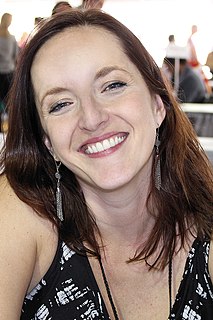A Quote by Amiri Baraka
I'm trying to make the poems as musical as I can - from the inception. So that whether they're read on the page, or people read them aloud, or I read them aloud, the musicality will be kind of a given.
Related Quotes
We have an obligation to read aloud to our children. To read them things they enjoy. To read to them stories we are already tired of. To do the voices, to make it interesting, and not to stop reading to them just because they learn to read to themselves. Use reading-aloud time as bonding time, as time when no phones are being checked, when the distractions of the world are put aside.
As for the differences between audio and the printed page, the sonic aspects of poetry are important to me. I read my poems aloud to myself as I'm composing them. And I enjoy reading to an audience. I think people get tone more easily when they hear a writer read her work. Some people have told me they hear more humor in my poems at a live reading than when they see them on the page. I think that may be a matter of pacing. On the other hand, I've listened to a lot of poetry readings and I know how much you can miss. If you stop to really register one line, you miss the next three or so.
Find something you like, go into a room, close the door and read it aloud. Read it aloud. Everybody in the world who likes dance can see dance, or hear music, or see art, or admire architecture - but everybody in the world uses words who is not a recluse or mute. But the writer has to take these most common things, more common than musical notes or dance positions, a writer has to take some adverbs, and verbs and nouns and ball them up together and make them bounce.
If we are always reading aloud something that is more difficult than children can read themselves then when they come to that book later, or books like that, they will be able to read them - which is why even a fifth grade teacher, even a tenth grade teacher, should still be reading to children aloud. There is always something that is too intractable for kids to read on their own.
I read everything. I'll read a John Grisham novel, I'll sit and read a whole book of poems by Maya Angelou, or I'll just read some Mary Oliver - this is a book that was given to me for Christmas. No particular genre. And I read in French, and I read in German, and I read in English. I love to see how other people use language.
Experts generally agree that taking all opportunities to read books and other material aloud to children is the best preparation for their learning to read. The pleasures of being read to are far more likely to strengthen a child's desire to learn to read than are repetitions of sounds, alphabet drills, and deciphering uninteresting words.
I've only cried at one book, but I'm too embarrassed to tell you which. It wasn't terribly intellectual. I will admit, though, to crying when I've read books aloud to my elementary class. We read a biography of Gandhi once, and it was very difficult to read the part where Gandhi was killed, because they were waiting for a happy ending.
A lot of actors choose parts by the scripts, but I don't trust reading the scripts that much. I try to get some friends together and read a script aloud. Sometimes I read scripts and record them and play them back to see if there's a movie. It's very evocative; it's like a first cut because you hear 'She walked to the door,' and you visualize all these things. 'She opens the door' . . . because you read the stage directions, too.






































